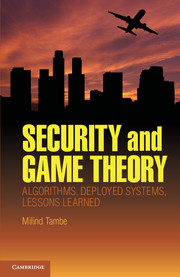Book contents
- Frontmatter
- Contents
- Acknowledgments
- 1 Introduction and Overview of Security Games
- PART I SECURITY EXPERTS' PERSPECTIVES
- 2 LAX – Terror Target: The History, the Reason, the Countermeasure
- 3 Maritime Transportation System Security and the Use of Game Theory: A Perfect Match to Address Operational and Tactical Concerns
- PART II DEPLOYED APPLICATIONS
- PART III EFFICIENT ALGORITHMS FOR MASSIVE SECURITY GAMES
- PART IV FUTURE RESEARCH
- PART V SHORT BIOS
- References
- Index
- References
3 - Maritime Transportation System Security and the Use of Game Theory: A Perfect Match to Address Operational and Tactical Concerns
from PART I - SECURITY EXPERTS' PERSPECTIVES
Published online by Cambridge University Press: 05 January 2012
- Frontmatter
- Contents
- Acknowledgments
- 1 Introduction and Overview of Security Games
- PART I SECURITY EXPERTS' PERSPECTIVES
- 2 LAX – Terror Target: The History, the Reason, the Countermeasure
- 3 Maritime Transportation System Security and the Use of Game Theory: A Perfect Match to Address Operational and Tactical Concerns
- PART II DEPLOYED APPLICATIONS
- PART III EFFICIENT ALGORITHMS FOR MASSIVE SECURITY GAMES
- PART IV FUTURE RESEARCH
- PART V SHORT BIOS
- References
- Index
- References
Summary
Since the days of Sparta and Athens the use of the world's Maritime Transportation System (MTS) to move goods and services has been a critical facet of a nation's economic well-being. The MTS served as a “center of gravity” with nations trading as far away as distant continents or as close as two ports located in the same country or region. Corbett and Winebrake (2008: 6) summarized that the MTS “is an integral, if sometimes less publicly visible, part of the global economy” and that the MTS consists of “a network of specialized vessels, the ports they visit, and transportation infrastructure from factories to terminals to distribution centers to market.” The security of this system is imperative as goods move through the ports and waterways within national boundaries, into the littorals, and out into the world-wide Global Maritime Commons.
The issue of security within this global system is complicated because the number of attack vectors and methods an adversary can take are endless. The attackers also hold an advantage in their ability to select the time, place, and method of an attack … and to abort an attack if counterdetection occurs. The introduction of suicide attackers has made the security challenge even more daunting as bombers are willing to give their own lives for their cause. Pape (2003: 344) noted that “suicide terrorism is strategic. The vast majority of suicide attacks are not isolated or random acts by individual fanatics.”
Information
- Type
- Chapter
- Information
- Security and Game TheoryAlgorithms, Deployed Systems, Lessons Learned, pp. 51 - 64Publisher: Cambridge University PressPrint publication year: 2011
